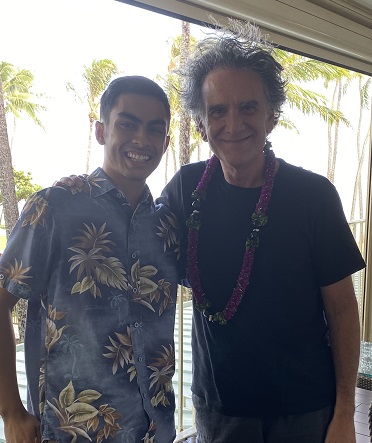A Student’s Perspective: written by Elijah Abramo ’21
Peter Buffett is the son of Warren Buffett, but he is much more than just that.

“Actually people thought I was related to Jimmy Buffett the singer”
Warren Buffett, the biggest name in the investing business is known for his massive success and dedicated frugality. Peter, is quite frugal himself. Despite being thrust into the spotlight in 2006, as his father gave away his fortune to his children to each start billion-dollar foundation, Peter has stayed humble. This was quite apparent in my time with him.
If you don’t know Peter, you may believe that he is business-focused like his father. Rather, he is a composer, pianist and Grammy Award winner for soundtracks he has created over the years. He still composes but has focuses on philanthropy as co-chair of the Novo Foundation, which supports initiatives to end injustices to women and indigenous communities around the world.
He is also visiting university communities around the United States with his Concert and Conversation series, which was his reason for being in Hawaii.
This was Peter’s first time being in Hawaii. Not only did he want to “relaxercise” (how he says he stays fit) and take in the wonderful scenery, but also learn about Hawaii’s poverty, homelessness, early childhood development and various other social issues that were brought via colonialism and the current economic system.
I was fortunate to be given the opportunity to have a one-on-one interview with Peter.
As any college student would, I asked about his advice for me. He brought it back to his career.
“(When first starting in his music career) I said yes to everything because I knew it was more about my agreeability and willingness to kind of get in there and do whatever it took than my talent to some extent, cause I had enough talent but it was more my personality.”
He encouraged me to be passionate about my work but also broadening my possibilities.
“Sometimes people can get so narrow in what they want to be that they forget that there’s a whole ecosystem of possibility around that (their passion), that could still give you joy.”
In a short time, It was clear that he could talk about anything while not overstepping his credibility. “That’s why I tell my story as opposed to telling advice,” is one of Peter’s guiding principles.
He knows that he has been very lucky in life, but he also has gone through his own struggles just like all of us.
I attended his Concert and Conversation event the next day at the Hawaii Theatre, ready to learn more.
The concert was something that most people didn’t expect, He discussed topics such as feminism and colonialism in the detail and his music followed his own story.
First, Peter discussed his childhood growing up in Omaha, Nebraska saying, “I was safe, seen and heard. Peter cited the importance of each while growing up.
He then discussed his career from writing music for TV ads to soundtracks for movies.
Next, he discussed his foundation work, where the conversation got heavier. Peter talked about his first time being in Kolkata and having met a girl only 10 years old being sex trafficked. “I asked her how I could help, and she said ‘tell my story,’ so I did.”
Through his music, he transported the audience to the red light district of India, broken villages of West Africa and many other impoverished communities. Images of people in despair were heightened with the tense somber playing of his cellist Michael Kott.
Finally, he discussed the hope for the future, “community will be the last thing we have in humanity and will be the key to solving our problems.”
Here in our Chaminade ohana, let’s stay committed to keeping these conversations going.



